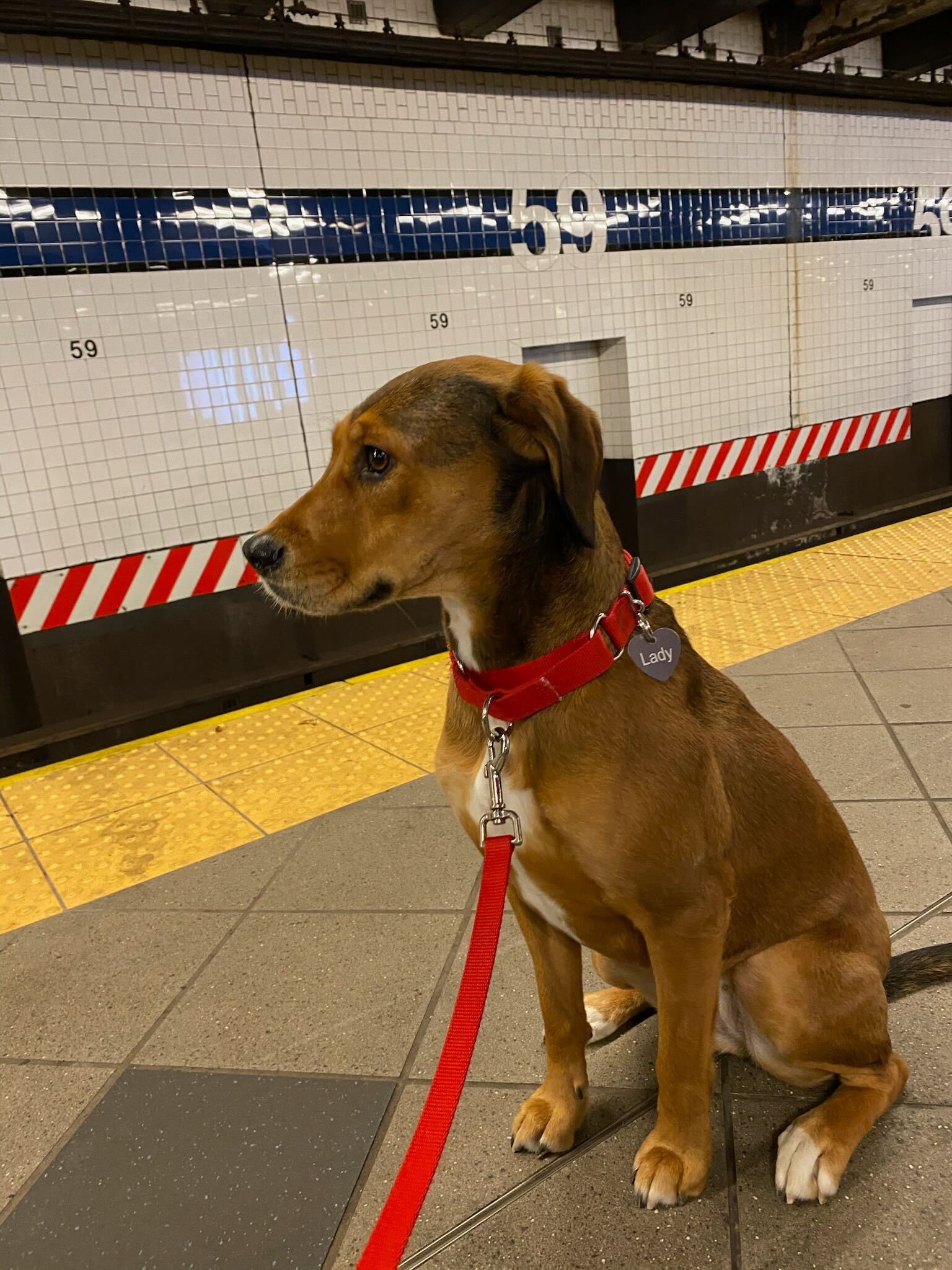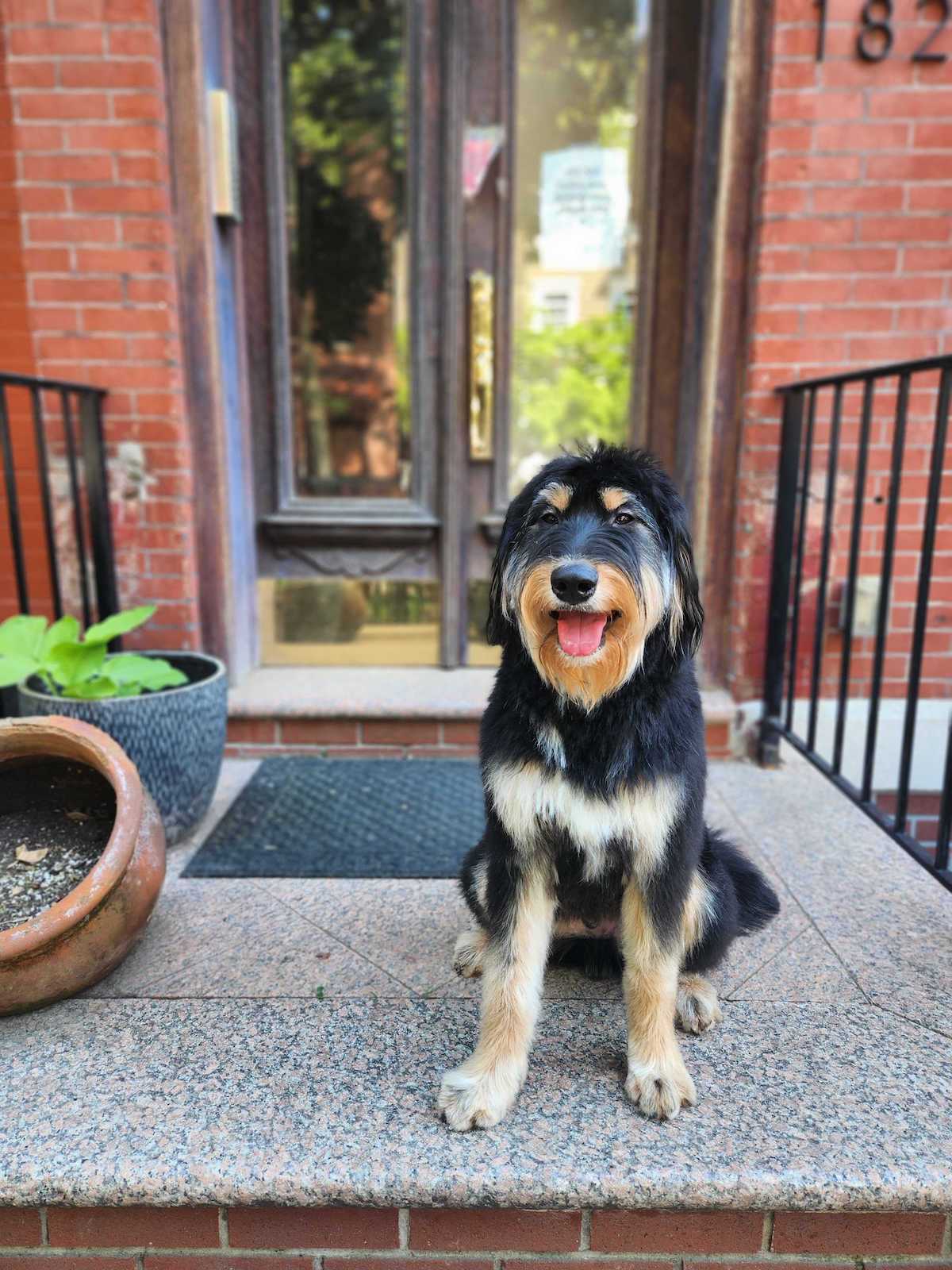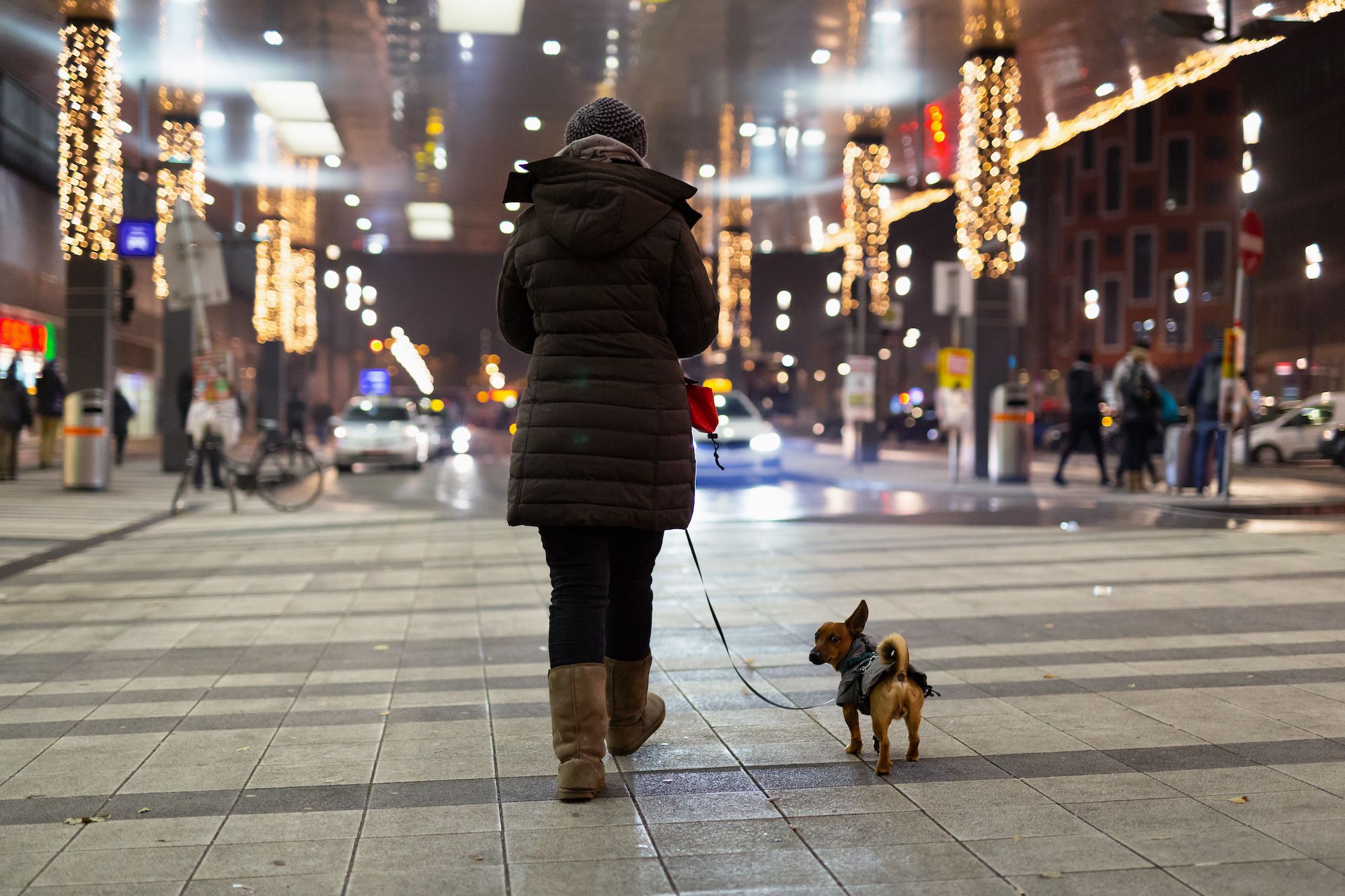It’s an oft-repeated notion that dogs need a vast expanse of grass all their own, like a big yard in front of a suburban house. Critics may feel that it’s an insult to some dogs’ dignity that they are reduced to strolls through municipal parks while others luxuriate in their own private outdoor spaces. Even some city-dog people ask themselves whether their dog would be happier living on rural acreage.
Despite these doubts, there’s nothing inherently wrong with keeping a dog in a city. Plenty of dogs can enjoy living in urban areas, even within the confines of a small apartment, as long as they receive proper exercise, social contact, and care from their people. And life behind a picket fence is no panacea; dogs with dominion over front lawns can nevertheless be bored or otherwise unfulfilled.
For insights on what it takes to raise a contented dog amid skyscrapers, subways, and crowds, we reached out to a trainer and an expert in dog cognition. Here are some of their tips.
Dogs need mental and physical exercise, but not necessarily a yard
Denise Herman, founder and head trainer at Empire of the Dog in New York City, tells us that a yard isn’t as vital to dogs as many people think. “They need your time,” she says, “more than they need a space.”
“No dog who is simply put in a suburban backyard gets enough mental stimulation or exercise,” says Dr. Alexandra Horowitz of Barnard College’s Dog Cognition Lab. An energetic, intelligent dog who lives in a city and gets out multiple times a day for exercise, sniffy walks, and brain games can be happy; the same dog can be miserable in the suburbs if they are left to entertain themselves.
Dogs studied recently by the Dog Aging Project experienced better health when they lived with other dogs. And while some individual dogs like having canine friends at home and others don’t, all of them need company from someone who loves them. Whether you live in a small apartment or a big house, one of the most important things you can do for a dog’s well-being is spend time with them. If you live in the city with an “only dog” who does like socializing with other pups, training classes, parks, and playdates can give them opportunities to do so.
In addition to the positive reasons your dog needs your time and attention, unsupervised dogs can run into trouble in rural settings and even familiar backyards—which may contain hazards from which you should protect them. Depending on where you live, these can include alligators, coyotes, or—overhead—hawks. As Herman says, “even a poisonous mushroom could spring up overnight.” You’ll have to survey a yard to make sure it’s safe for your dog’s romp, and you’ll need to supervise and engage with them.
There is no “best breed” for city life
Asked whether any breeds make for better apartment dogs, Dr. Horowitz says: “A better question would be: Are there qualities that make for a better apartment-dog person? If you live with a dog in an apartment, you need to be a participant in your dog’s getting time to run, socialize, and relieve themselves. If you are a breed of person who is not willing to do this several times daily, then you might not be a good apartment-dog person.”
“People think that they need a small dog, because they live in a small apartment,” says Dr. Horowitz. In reality, she says, “small dogs can be much more active than very large dogs, and need more person-attention.”
Meanwhile, says Herman, “a 2-year-old Great Dane just often lays there” for long stretches of the day as long as they’ve received a few walks and some play.

When we asked Dr. Horowitz if there were any breeds of dog that must never live in a city, she returned to the individual differences between dogs. “There is too much variability between individuals in a breed to say this,” she said. “But certainly many dogs have needs or personalities that will mean they need more explicit assistance in helping them be happy. That might mean a person who runs with them (if they are an energetic dog) or gives them “work” (like mental and physical stimulation) if their breed is one that thrives with something to do.”
Dogs’ individuality doesn’t mean that you should ignore their breeds altogether. Border collies are likely to need an immense amount of mental and physical exercise, beagles tend to be very vocal and scent-driven, and retrievers are generally keen to retrieve. These are reasonable factors to keep in mind depending on your city lifestyle. But you should also know that breed is no guarantee of a personality; you get the dog you get. If they deviate from your expectations, that doesn’t mean there’s something “wrong” with them.
If you want more assurance about how a dog might act, consider adopting an adult whose behavior and needs may be more established. “If you have a dog who’s about a year old that’s in a foster home,” says Herman, “[their foster parents will] have a sense of ‘is this a high-energy dog? Is this a low-energy dog?’—so you can go based on that.” If you really want a quiet canine roommate for your thin-walled apartment, your best bet is an adult dog who’s already proven to be on the less-vocal side.

Cities present certain challenges for dogs and their humans
Some hazards are more prevalent in cities, if not exclusive to them. In the summer, pavement can get hot enough to burn paws—and in the winter it may be covered in road salts that can poison dogs. There may also be litter, including some—a stray chicken bone, perhaps—that’s very interesting to dogs but also a threat to them. It’s up to you to feel with your hands and look closely to make sure that your pup is not exposed to anything dangerous.
“If you’re in a city,” Herman says, “the biggest difference is the volume and variety of stimuli.” Cities can bring a deluge of sounds, lights, humans, and other dogs, and not every dog is prepared for that. Honking horns, sidewalk scooters, rowdy crowds leaving bars, and neighbors slamming doors in your hallway are among the provocations that might set your dog off.
Herman emphasizes becoming an expert in dog body language and reading their signals about whether they’re comfortable in a situation.
“You’ve got to be able to see these subtleties,” she says, “so that you know that a dog who’s walking away from something is intentionally leaving. It’s not arbitrary.” Cities may offer opportunities to bring your dog with you on trains, to outdoor cafes, and on errands. Some dogs will love keeping you company on a leash or in a bag, and others may show stress by licking their lips, trying to get away, or tucking their tails. Be honest with yourself about how they seem to feel, and don’t force them into situations they don’t like.

Also be aware that tying your dog up outside of a store while you shop carries major risks—dogs can be stolen or otherwise harmed while away from their people, even for just a minute.
If you’re trying to socialize your dog to city stimuli, Herman urges caution and patience. You want to take it slow so that your dog’s early experiences are positive. “If you don’t have enough runway behind you” when something goes wrong, Herman says, “if your dog doesn’t have enough of an archive of experiences to draw from… then this bad experience has so much more heft than it needs to have.”
Renters in cities know that an apartment search can be trickier with a dog, as many buildings do not allow pets. Some have breed restrictions. Others, even if they allow dogs, may keep a close eye on tenants and their dogs, watching for any sign of misbehavior. This is not, on its own, a reason not to get a dog—lots of city dwellers manage it—but it does present a chance to ask yourself what you’re getting out of caring for a dog and what that relationship will do for both of you. For many, the extra hurdles are well worth it.

Dogs can be happy in a city, and can make your life there better
You may have heard about what dogs can miss out on if they live in a city, but life in a metropolis has benefits for them as well.
“Dogs raised in the city have so much contact with other dogs,” says Dr. Horowitz, “and other dog smells, that very often they become generally more sociable. (Not all dogs do well with others, though, of course).”
And a dog can make your life in a city much better, too. As Herman puts it, “In a city that is out of your control and chaotic, your dog is a faithful, reliable companion. That’s what we all want, is a thing we can come home to or be home with that is reliable. ‘This my dog, and my dog just wants to be with me.’”
The post Is It OK To Have a Dog in the City? appeared first on The Farmer's Dog.


Comments
Post a Comment